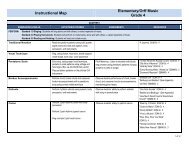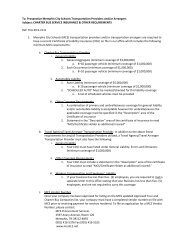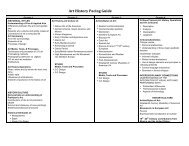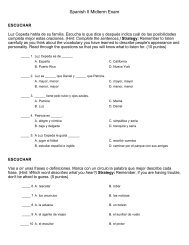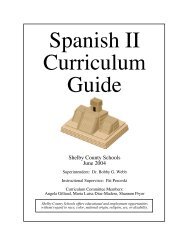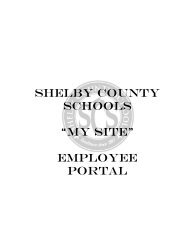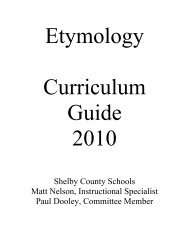CIGNA HEALTHCARE OF TENNESSEE Important plan information for
CIGNA HEALTHCARE OF TENNESSEE Important plan information for
CIGNA HEALTHCARE OF TENNESSEE Important plan information for
You also want an ePaper? Increase the reach of your titles
YUMPU automatically turns print PDFs into web optimized ePapers that Google loves.
A Business of Caring.<br />
You’re<br />
covered <strong>for</strong><br />
emergencies<br />
24 hours a<br />
day, at home<br />
or away.<br />
Call your<br />
PCP <strong>for</strong><br />
Urgent Care<br />
situations.<br />
SELECTING YOUR DOCTOR<br />
Follow your employer’s instructions <strong>for</strong> enrolling in the <strong>CIGNA</strong> HealthCare <strong>plan</strong>. If<br />
your employer asks you to fill out an enrollment <strong>for</strong>m:<br />
■ Use the enrollment <strong>for</strong>m to enter your choice(s) of Primary Care Physicians.<br />
■ If using the <strong>for</strong>m, write the name of each family member, the name of the<br />
Primary Care Physician, and the doctor’s ID number as shown in the directory.<br />
■ Complete the rest of the <strong>for</strong>m and submit to your benefits department as directed<br />
by your employer.<br />
■ You can also change your PCP online at www.cigna.com.<br />
YOUR SUMMARY <strong>OF</strong> BENEFITS<br />
Your Summary of Benefits gives you important <strong>in<strong>for</strong>mation</strong> on the medical benefits<br />
and other types of services your <strong>plan</strong> covers. You should read your Summary of<br />
Benefits to determine whether you have prescription drug coverage, coverage <strong>for</strong><br />
mental health and substance abuse, and/or vision care coverage as a part of your<br />
<strong>CIGNA</strong> HealthCare <strong>plan</strong>.<br />
EMERGENCY CARE<br />
An emergency is a sudden unexpected injury or a serious illness that a prudent<br />
layperson (a person with average knowledge of medical science) believes needs to<br />
be treated right away, or it could result in loss of life, serious medical complications<br />
or permanent impairment.<br />
■ You and covered family members are covered <strong>for</strong> emergencies 24 hours a day,<br />
seven days a week – at home, in your home area, or away on a trip.<br />
■ In an emergency, always seek medical care immediately. Go directly to the<br />
nearest emergency facility (even one that is not part of the <strong>CIGNA</strong> HealthCare<br />
network), or call 911 or your area’s local emergency services number.<br />
■ You do not need a referral from your PCP or any authorization be<strong>for</strong>e receiving<br />
emergency care.<br />
■ If you have been treated <strong>for</strong> an emergency, call your PCP (or have someone call<br />
<strong>for</strong> you) <strong>for</strong> further assistance and directions on follow-up care. When possible,<br />
you should call within 48 hours.<br />
EXAMPLES <strong>OF</strong> EMERGENCIES:<br />
■ Seizure or loss of consciousness<br />
■ Poisoning or suspected overdose of<br />
medication<br />
■ Uncontrolled bleeding<br />
■ Broken bones<br />
■ Shortness of breath<br />
■ Chest pain or squeezing sensation in<br />
the chest<br />
■ Sudden paralysis or slurred speech<br />
■ Severe pain<br />
URGENT CARE<br />
Some situations require prompt medical attention although they are not<br />
emergencies. In these situations, call your Primary Care Physician and describe the<br />
situation. He or she will direct you to the most appropriate type of care.<br />
5



